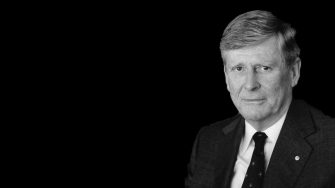Murray Gleeson recalls a memorable career, in the 2022 Mason Conversation
Murray Gleeson recalls a memorable career, in the 2022 Mason Conversation.
Murray Gleeson recalls a memorable career, in the 2022 Mason Conversation.

In a wide-ranging examination of his life working and serving as a highly accomplished legal mind, Murray Gleeson AC has spoken of the importance of the legal profession in Australian society.
The former Chief Justice of the High Court of Australia was speaking with UNSW Law & Justice’s Professor Rosalind Dixon, Director of the Gilbert +Tobin Centre for Public Law, as part of the 2022 Mason Conversation.
Speaking at the event, hosted on Wednesday 3 August, Murray Gleeson spoke of some of his more memorable moments in the profession.
One of those was just a few weeks into his career as a barrister when he would get a memorable case.
A man, with a long criminal history, had been accused by police of burglary, breaking, entering and stealing.
“The police had no real evidence against him, the only evidence they had was an alleged verbal declaration of guilt. He also had a long criminal history which made it improbable he would engage in confessional statements,” he said.
“I met him in the cells... he ridiculed the idea he made a confession to the police. He told me he was up at Kings Cross with a woman he named who was a notorious woman associated with drugs and being involved in witchcraft and so I thought that was not a name to conjure with in front of a jury.”
“It became apparent that the prosecution didn’t have any evidence beyond the alleged confession and the jury began to roll their eyes and then the police officers,” he said.
The charges against the man failed in court, who was free to go at the end of the trial.
It had been Mr Gleeson’s first criminal trial in front of a jury.
Speaking to Professor Dixon, Mr Gleeson said the demands for a Chief Justice of the High Court of Australia were significant, especially when assessing controversial cases, or matters where the legal profession was in the media.
“I don’t think there’s a general rule for that I think you need to handle it on a case-by-case basis,” he said.
“On my time in the Supreme Court unfortunately there was a former judge of the court who took his own life in circumstances of controversy and publicity. The public information officer dealt with the media … as well as the judge’s family.
She handled that very well, tactfully.
[And so] if you’re going to leave things with a court officer with issues that have arisen you need someone in whom the media will have confidence. And apart from that I think you just have to look at the issues as they develop on a case-by-case basis."
Professor Dixon asked Mr Gleeson what his take had been on the tensions of power between the federal and state governments amid the COVID-19 pandemic, and the use of powers by various state governments under health orders to keep people at home and restrict the movement of citizens.
Mr Gleeson said the COVID-19 pandemic had shown how jurisprudential considerations had very real effects on everyday citizens and their daily lives.
“Australians have been well and truly reminded in the last couple of years they live in a federation,” Mr Gleeson said.
[Historically, past Commonwealth] control orders contained very modest restrictions compared to the restrictions of all Victorians or all people in New South Wales over the last couple years,” he said.
“Indeed, the state governments not only exercised powers requiring people to remain at home but exercised powers to exclude people from their homes, a restriction of a quite different quality.
State governments have extensive powers to restrict the movements of people as they have restricted your movements and my movements over the last couple of years. Restrictions on the movements of people within borders, were done by executive regulation, not by judicial decision making on a case-by-case basis,” he said.
The Mason Conversation is a series named in honour of Sir Anthony Mason AC KBE GBM, marking his contribution over decades to UNSW.
As well as a highly distinguished career in law, including as a Chief Justice of the High Court of Australia, Sir Anthony was the fifth Chancellor of UNSW from 1994 to 1999. He was also the inaugural Chair of the Advisory Committee to the Gilbert + Tobin Centre of Public Law.
The 2022 Mason Conversation was hosted by the Gilbert + Tobin Centre of Public Law together with UNSW’s Faculty of Law & Justice and can be viewed in full here.